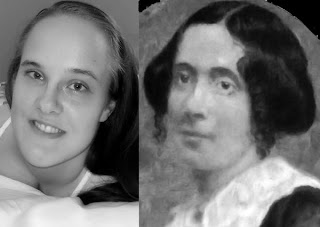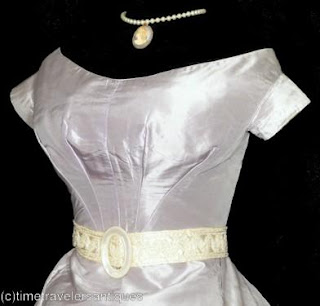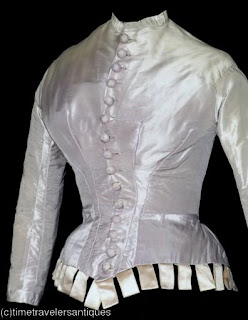>I am going to have to write this blog in the third person and detach myself emotionally from it, otherwise the things that need to be said will get jumbled and sound like I’m lashing out. I will, however, say that it took me years to get to a point where “the Fanny backlash” no longer causes me serious pain. That life ended in 1905 and even though I’m very public about my past life, including writing this book telling my story, part of my journey has been to teach myself to let go of the lingering anger and sorrow from that life. I was well aware of what people thought of me back then and I’m well aware of what people think of me now. I will never fit in with the status quo and I have accepted that.
All that being said, from a historical perspective, there seems to have been a poisonous myth grown up around Fanny Chamberlain that needs to be eradicated. As long as I am here and breathing, I cannot let the myth stand untested. This is where I will turn to third person in speaking about her to address the myths.

Up until the publication of Diane Monroe Smith’s book, Fanny & Joshua, in 1999, historians left Fanny as an unpleasant footnote in Joshua Lawrence Chamberlain’s biographies. Pictures were painted of her as being cold, unfeeling, self-serving, flighty, vain and a spinster desperate to marry the first available man whether she loved him or not. I have seen some people go as far as to say she was a lesbian and spent more time with her lesbian lovers than her own husband. We have to ask ourselves as historians and history enthusiasts today, where did these ideas originate? Certainly they did not originate from primary sources and that is the most frustrating aspect of the entire subject. The opinions about Fanny cannot come from primary sources because the bulk of Fanny’s written material has either been destroyed over the years or is in private collections inaccessible to the public.
Also, much of the Fanny myth was spun by her granddaughter, Rosamond Allen, who only knew Fanny for the last twelve years of her life. By that point, Fanny was dealing with the depression that came with the total loss of her eyesight. Rosamond only knew a woman suffering from illness, disability and depression. She cannot be relied upon to paint an accurate picture of a life that spanned 80 years. In the 1930s, Rosamond sold the Chamberlain house and almost everything in it. I have heard things about how she got rid of papers and letters that I cannot repeat, but it points to a granddaughter born so late that she had little to no attachment to her grandparents’ possessions. This is not as reliable of a source as people think.
Another part of the general Chamberlain myth was spun by Ellis Spear. He served under Lawrence in the 20th Maine and took over after Lawrence was promoted out of the regiment. They began as friends but by the late nineteenth century into the early twentieth century, Spear became bitter and argued with Lawrence about things that happened forty or fifty years before. Spear was not truthful in all of his accounts, yet one of the biographies about Lawrence drew heavily from his writings. That particular biography was very critical of Fanny when it mentioned her at all and many of the conclusions drawn were by the modern author who skewed his own opinion into the documentation. Biographies are dangerous when the author takes too much liberty with interpretation and preconceived notions.
So, who do we believe about Fanny? We could begin by addressing the biggest myth about her – that she never loved her husband, Joshua Lawrence Chamberlain. Since there isn’t a lot of her written material left in comparison to the volumes of his written material, people seem to draw the conclusion that there was no love for him, or that she was even incapable of love altogether. I have a few very telling pieces of her letters that I have found deeply buried online and in the Smith book. Let’s look:
I am sitting now at the same window where we sat together all that night. How could you think that I would shrink from you ever! You who seem so holy, so pure and noble to me! — how could I even if you did press my finger to your dear lips? O! there was nothing even then, that you could have done that would not have seemed beautiful and right to me. Ah! those nights! so full of terrible beauty; will they never come again?…O! dear Lawrence I would know you more, and I would have you know me as you never have known me. My soul longs to speak to yours as it never has spoken…I rest in you as I never have rested before; — you know it, do you not? and I would be everything to you; I would nestle closely in your arms forever, and love you and cling to you and be your ‘bird’: dear, precious heart! -January 1852
She’s a cold hearted snake, right? That certainly sounds like a woman deeply in love to me, especially when you take into account her other letters that she wrote expressing the fact that she had a difficult time expressing her feelings. That really gets to the heart of the matter. Lawrence had a habit, in his excitement over having a lady love, of showing her letters to his mother, his sister, his brothers, their friends, etc. He thought she hung the moon and he wanted other people to think she hung the moon too, so he showed people her thoughts and feelings. Fanny was very private about what she thought and felt, however. When she found out what he was doing, she begged him to stop showing people her letters and she stopped expressing her deepest feelings in future letters, instead choosing to make their face-to-face encounters that much sweeter and more private. She explained her position:
You know dear Lawrence that I may breathe to you, even as to my own heart, in all innocence and perfect trustfulness, those things which would ever sink me in the estimation and respect of any third person; for no other being can know what we are to each other. -ca. 1850s
Neither Fanny nor Lawrence were without their faults. Lawrence had a terrible jealous streak, he could be very insecure, he came on very strong with his feelings and wore his heart on his sleeve. He had not endured abandonment and loss as Fanny had in her youth. Fanny’s private nature and difficulty expressing her feelings was rooted in the fact that she was sent away from the only home she ever knew at the age of four to be shipped around to various relatives until she was finally adopted by her biological first cousin, Reverend George Adams. We know now the damage that an unstable early childhood and adoption can do to a person when the matter is not handled carefully. She grew up in a good home but her behavior suggested that she feared abandonment and chose to rely on her own independence than rely on people who might disappear someday.
People also seem to assume that Fanny’s early desire for a platonic marriage was a sign of her distaste for Lawrence. We have to look outside of the bubble of their relationship to understand why Fanny might have felt that way. In the nineteenth century, childbirth was the biggest threat to a woman’s life. As a girl, Fanny heard of a local woman who lost her husband at sea and she developed a fear of ships and water that lasted the rest of her life. If one takes that into consideration, then hearing of another local woman who died in childbirth would certainly inspire fears for her own life in the bloody mess of having children.
Perhaps the biggest reason why Fanny wanted to delay motherhood was because of how she lived her life before she was married. The majority of women at that time never had any real independence. They went from their father’s household to their husband’s household, ultimately ruled by both men in different phases of her life. Fanny, on the other hand, didn’t even get married until she was 30, although she did want to be married earlier. There was a gap in her adult life without a husband to rule her. She moved to Portland from Brunswick in the late 1840s and lived in a studio in a part of the city populated by artists, sculptors and musicians. She led an independent life there, which was very unique for women of her time. Only the illness and death of her adoptive mother brought her back home to Brunswick and falling in love with Lawrence kept her from going back to that life in Portland.
Fanny was also more educated than her peers. She went to a music school in New York City where she learned to become a music teacher herself. She then moved a thousand miles away to Georgia and became a music teacher at a ladies school. Her decision to go was not her lack of love for her fiance but because she refused to enter into a marriage with debts. Upon marriage in those days, everything belonging to a woman became the legal property and responsibility of her husband, including any debts she incurred as a single woman. She refused to do that to Lawrence, so while he finished his education, she worked to improve their future. She resisted the idea of becoming a housewife bound to home and hearth because it was, frankly, a waste of her education and talents, and she knew it. Also, she knew they were not a wealthy couple and she did not want Lawrence to shoulder the responsibility of providing for the family alone. If she had an education and work skills, in her mind, two incomes were better for their future than one. Having children too soon would force her to stay home.
Lawrence suggested that they delay conceiving a child for a few years by using contraceptives. He knew her better than the historians do today and he knew that her idea for a platonic marriage was not due to her lack of desire for him. On the contrary, his letters from that period of discussion show that they were well aware of their mutual desire, or “that measure of humanity,” as he called it. Birth control was illegal in those days, so the fact that they discussed the future of their sexual relationship at length shows that they were trying to compromise on Fanny’s fear of childbirth and her desire to contribute to the family. The fact that Fanny conceived within four weeks of their wedding day and the rapid births of children clearly shows that their physical relationship was intense and a natural extension of their mutual love.
This is just a small piece of the myth of Fanny Chamberlain. There is a lot more to it but I don’t want to make the blog too long.
As a somewhat altered, maybe wiser, no less emotional development of a soul that once bore the name Fanny, I can tell you unequivocally that my heart loved his. Part of my soul will never stop loving his. I understand the curiosity about our lives at that time and I understand there are a lot of Lawrence’s female fans who loathe me because my name was once Fanny Chamberlain. Some of his fans can be rather hardcore and unwilling to see the other side of the coin. I was basically spat on and unfairly judged just last night by someone who deemed herself “crazy about Lawrence.”
Please remember when you study anybody famous in history that they are not just words on a page or grainy black and white pictures to be judged, picked apart, adored, hated, objectified, and so forth. The soul is deathless. Just because the life concluded does not mean those souls are gone forever. We are out there amongst you feeling the shadows of our old identities. Don’t judge us without knowing the whole story. Whether you believe it or not, I did love him and I devoted as much of my life to him as I could, though neither of us were perfect.
To learn the rest of my story, please click the book below.
Read More


















